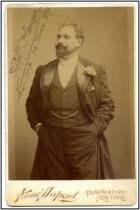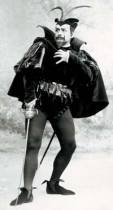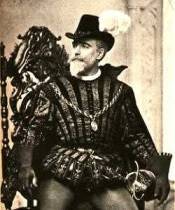
Pol-Henri Plançon (12 June 1851 – 11 August
1914) was a distinguished French operatic bass (basse chantante). He was one of
the most acclaimed singers active during the 1880s, 1890s and early 20th
century—a period often referred to as the "Golden Age of Opera".
In addition to being among the earliest
international opera stars to have made recordings, he was a versatile singer
who performed roles ranging from Sarastro in Wolfgang Amadeus Mozart's Die
Zauberflöte of 1791 through to core bass parts composed in the 19th century by
Giacomo Meyerbeer, Charles Gounod, Giuseppe Verdi and Richard Wagner, among
others.
He was renowned for his exquisite legato
singing as well as for his crisp diction, limpid tone, precise intonation, and
virtuosic mastery of ornaments and fioriture. While not huge, his voice was of
more than ample size, making a consistently positive impression in such large
theatres as the Metropolitan Opera in New
York City. It always moved with exemplary suppleness,
allowing him to execute flawless trills and rapid scale passages with
remarkable precision and suavity.
Pol Plançon was born in Fumay, in the Ardennes
département of France,
near the Belgian border. "Pol" is a pet form of Paul.
Blessed with a fine natural voice, he commenced
learning to sing with the pivotal French tenor Gilbert Duprez (the originator
of the "chest voice high C"), who had turned to teaching after his
retirement from the stage. Duprez had enjoyed a distinguished career in Italy, where he
created Edgardo in Donizetti's Lucia di Lammermoor in 1835. Plançon
supplemented his studies with Duprez with lessons from Giovanni Sbriglia, who
taught many outstanding opera singers at his Parisian studio, most notably the
brothers Jean de Reszke and Édouard de Reszke, with whom Plançon would sing
quite often in future years.
In a 1905 interview with the New York Times
newspaper he said that he had modelled his technique on the vocal method of a
celebrated predecessor, the baritone Jean-Baptiste Faure, who had been an idol
of Parisian audiences during the 1860s and '70s
He performed on the European scene from 1891 to
1904, most importantly at the Royal Opera House, Covent Garden, in London, where he
participated yet again in numerous premieres. One of these occurred on 11 June
1892, when he appeared in the first staging of the The Light of Asia, by
Isidore de Lara.
Other operatic first performances that he
graced with is presence included: on 20 June 1894, La Navarraise, by
Massenet; on 30 June 1901, the operatic adaptation of Shakespeare's Much Ado About Nothing, by Sir
Charles Stanford; in 1901, Le roi d'Ys, by Édouard Lalo; and in 1904,
Hérodiade, by Massenet.
English commentators were enthusiastic about
his contribution to these premieres, as well as his singing in the standard
repertory roles, including Rocco in Ludwig van Beethoven's Fidelio,
Méphistophélès in Faust, Ramfis in Verdi's Aida, Pogner in Wagner's Die
Meistersinger von Nürnberg or Jupiter in Gounod's Philémon et Baucis. Only his
portrayal of Mefistofele in the eponymous opera by Arrigo Boïto, essayed in
1895, was received with reservations by the music critics. They felt that
Plançon's true home lay in the French and Italian bel canto repertory and as a
consequence of this, Boïto's snarling demon was less suited to the singer's
debonair demeanour than the urbane devil that he portrayed so effectively in
Gounod's Faust.
It was in the height of his glory at Covent
Garden that Plançon was brought to the Metropolitan Opera in New York City by the impresario Maurice Grau.
He debuted there on 29 November 1893, in the role of Jupiter in Gounod's
Philémon et Baucis. All told, he appeared in the seasons of 1893-97, 1898–1901
and 1903-08. He gave a total of 612 performances with the Met company,
including both operatic stagings and concert appearances, whether in New York or in various
other American cities as part of the Met's touring ensemble. One should take
particular note of his 85 appearances as Méphistophélès in Faust, as well as
his participation in the American stage premiere of Hector Berlioz's La Damnation de Faust in
1906, singing the role of that other famous French Mephisto. In 1899, he
appeared in the inaugural performance of Mancinelli's opera Ero e Leandro 1899
(in the role of Ariofarne).
In 1906, he was staying in San Francisco with a visiting troupe of Met
singers (including Enrico Caruso) when a powerful earthquake and fire
devastated the city. He escaped the disaster shaken but unharmed. He left the
Met in 1908, following a final appearance as Plunkett in Friedrich von Flotow's
Martha at the theatre.
Upon his return to Paris at the age of 57, he retired from the
hustle and bustle of the stage while still in excellent all-round voice,
although the top notes of his range had begun to weaken. He occupied himself by
giving lessons to select pupils. He was 63 years old when he died in the French
capital in the summer of 1914, just as World War I was erupting in Europe.
He possessed a genuine bass voice, ranging from
the top F down to a resonant and easy bottom D, although the light and nimble
tone that he employed was suggestive of a higher-pitched instrument. From a
musicological standpoint, his singing is of considerable historical interest
because the refined vocal method that he employed was shaped prior to the
advent of passionate, slice-of-life Verismo opera in the 1890s. (To perform the
Verismo repertoire effectively, 20th-century singers were required to adopt a
less elegant and less florid style of operatic vocalism than had hitherto been
the norm.) Indeed, Plançon is considered to be one of the last important
figures in a long line of exceptional French basses and baritones stretching
back to the birth of operatic music's romantic era in the early decades of the
19th century. His predecessors and contemporaries in this Gallic bel canto
tradition included such celebrated artists as Henri-Bernard Dabadie, Nicolas
Levasseur, Luigi Lablache, Prosper Dérivis, Paul Barroilhet, Jean-Baptiste
Faure (see above), Victor Maurel, Jean Lassalle and Maurice Renaud.
During the height of his 30-year career, he was
confronted with stellar competition from a host of superlative operatic basses,
including his fellow countrymen Jean-François Delmas (whose sonorous voice he
particularly admired), Pedro (Pierre)
Gailhard, Juste Nivette, Hippolyte Belhomme and Marcel Journet. Other rivals
included Polish-born Edouard de Reszke, Bohemian-born Wilhelm Hesch, the
Italians Francesco Navarini and Vittorio Arimondi and, from a younger
generation of singers, the Russians Lev Sibiriakov and Feodor Chaliapin and the
Pole, Adamo Didur. He more than held his own in this exalted company,
remaining, then as now, the paragon of sophisticated and graceful vocalism.
Pol Plançon recorded various songs, operatic
arias and ensembles for the following firms: The Gramophone & Typewriter
Company, a forerunner of HMV (London, 1902–03), Zonophone (Paris, 1902), and the Victor Talking Machine
Company (New York, 1903–08). He also made four acoustic cylinders for
Lieutenant Bettini's phonograph company in 1897 but no trace of them has been
found. Most of his recordings are available on excellent CD transfers. The
Romophone label, for instance, issued in 1993 a double CD set containing all of his 46
extant Victor records (catalogue number 82001-2). They open a window on to a
vanished realm of 19th-century singing style and technical expertise.

01. Bellini: La sonnambula - Il mulino, il
fonte, il bosco. Rec. 23 Dec1903
02. Thomas: Le Caid - Enfin, chérie. Rec. 23
Dec 1903
03. Berlioz: La damnation de Faust - Devant la
maison. Rec. 29 Jan 1904
04. Gounod: Roméo et Juliette -Allons! Jeunes jens.
Rec. 29 Jan 1904
05. Rossini: Stabat Mater - Pro peccatis. Rec. 29
Jan 1904
06. Gounod: Faust - Vous qui faites. Rec. 29
Jan 1904
07. Adam: Le Chalet - Vallons de l'Helvétie. Rec.
27 Feb 1904
08. Gounod: Faust - Le veau d'or . Rec. 27 Feb 1904
09. Gounod: Philemone et Bauci - Au bruit des
lourde marteaux. Rec. 24 Jan 1905
10. Mozart: Zauberflote - Possenti numi. Rec. 24
Jan 1905
11. Haydn: Les Saisons - Chant du laboureur. Rec.
20 Feb 1905
12. Mozart: Zauberflote - Qui sdegno. Rec. 25
Feb 1905
13. Meyerbeer: Dinorah - En chasse. Rec. 25 Feb
1905
14. Gounod: Faust - Alerte, alerte. Rec. 24 Mar
1907
15. Verdi: Don Carlos - Je dormirai. Rec. 27
Mar 1907
16. Berlioz: La damnation de Faust. Rec. Voici
des roses - 27 Mar 1907
17. Berlioz: La damnation de Faust. Rec. Una
puce jentille - 27 Mar 1907
18. Flotow: Martha - Chi mi dirà. Rec. 27 Mar 1907
19. Meyerbeer: Etoile du Nord. O jours heureux.
Rec. 14 Apr 1908
20. Meyerbeer: Robert le Diable - Nonnes qui
reposez. Rec. 14 Apr 1908
21. Thomas: Mignon - Del suo cor calmai le pene. Rec. 14 Apr 1908

Source:
TodOpera.

